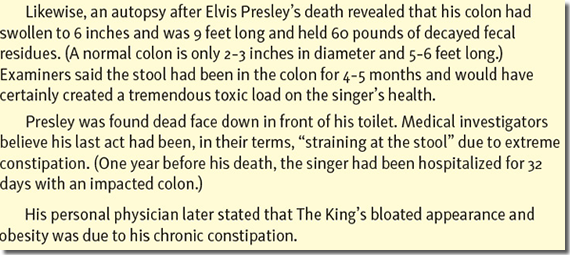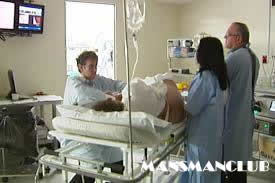Man, you surely know that many folks are full of s… Literally, it’s true.
I was always curious why some men have a belly like they are expecting a baby in 3 months, like my father-in-law. Please don’t laugh, it’s not funny.
THE PROBLEM
Guys, did you know that the folks who do the autopsies found that 90% (!) of the corpses' colons held an average of 5 to 20 pounds of hardened, decayed feces that were coated in layers on the intestinal walls. The study by the European medical scientists “…found 62% of adults whom doctors examined had an average of 10-12 pounds of residual fecal matter buildup in their large intestines and rectums.”
The medical examiners reported that many of these swollen colons had stretched to twice their natural size. One autopsy revealed a colon that was 9 inches in diameter with a channel through it no larger than a pencil. (Normal diameter is 2-3 inches.)
 I apologize for bringing this topic up. Please stay with me. This information is vital for your health!
I apologize for bringing this topic up. Please stay with me. This information is vital for your health!
Ninety percent is a staggering number of adults (probably including you) who are walking around with a backed-up bowel that holds pounds of old, impacted feces that is swelling their bellies and slowly making them sick. Even at 62%, it's still scary. It’s creepy because the majority of people today are not completely emptying their bowels every day as nature intended.
Is it dangerous to your health? You bet; it is. Over time, it will lead to:
- Painful joints and frequent back pain
- Chronically sore and painful muscles (myalgia)
- Mood swings, anger, irritability, memory blank-outs
- Fatigue and low energy
- Repeated headaches
- Bad breath, body odor, and stinky feet
- Memory problems
- Poor sleeping
How to recognize if you are having a problem down there? Some hints include sitting on the toilet for long periods and disappointing with your scarce results; days or even weeks without emptying your bowel fully; having the problem with bloating, gas, and the belly sticking out to the degree that you can’t see your Willy.
Why does it happen, man?
 When you are young, your bodily mechanisms are working like a clock, but as you become older, your metabolism slows and your internal organs work less efficiently. The food is processed more slowly, and, as a result, the hamburger you have eaten today may not be processed by your stomach by tomorrow. But since you eat almost the same volume of food every day, you are slowly overwhelming your colon.
When you are young, your bodily mechanisms are working like a clock, but as you become older, your metabolism slows and your internal organs work less efficiently. The food is processed more slowly, and, as a result, the hamburger you have eaten today may not be processed by your stomach by tomorrow. But since you eat almost the same volume of food every day, you are slowly overwhelming your colon.
As you age, the gastrointestinal tract (GI) begins to slow, and the amount of acid that helps process your food decreases. The same is true for various enzymes. I have always suspected that when we take multiple pills and medications (including pain relievers), we negatively affect our GI. The result: some dangerous substances begin to occur in your digestive tract (see the list above).
The same effect on your GI tract is caused by processed food, mainly when it contains added artificial or even sugar substitutes that are advertised as “natural”. When they are metabolized, normal bacteria in the GI tract break them down into by-products that irritate the colon and trigger gas, diarrhea, and bloating.
All of the above contribute to the problem of processing the food in your GI tract and leaving waste in your belly.
Over time, those fecal residues harden on the walls of the intestine, accumulating layer upon layer while leaving essential vitamins, minerals, and nutrients pass through your body undigested or absorbed.
I won’t describe the whole process of poisoning your body with toxins, but you got the picture.
The question is: how can you help your body eliminate waste effectively?
THE SOLUTIONS
There are a few ways of doing it, and I have used it myself:
- Drink much more water than you usually drink. I am personally not a big fan of drinking plenty of water – I drink only when I am thirsty, and I bet that many of you feel the same. However, I have recognized that I have to change my habits for the sake of my health. Here is a trick: drink a glass of water before you eat anything.
- Have one pill of the probiotic before going to sleep. Click on the link to learn more if you are not familiar with this term. Some publications recommend eating yogurts or kefirs that have live cultures, but I found that the small pill of probiotics with at least 16 microorganisms (beneficial bacteria) does a better job. Store them carefully according to the package instructions so that you don’t kill the live, active cultures.
- Eat more food that includes fiber. It’s nothing new here – you can read it everywhere. Including raw fruits and vegetables in your diet can make a significant difference. Dietary fiber makes your stool bulkier and easier to pass. A diet lacking in fiber has the opposite effect. Processed foods usually have a lot of calories and sugar, but very little nutritional value — which is why your digestive system has difficulty getting rid of them.
- If it’s not enough, here is one trick more: use the virgin olive oil as a dressing for your salad. Two tablespoons of oil per serving will work like magic. Very effective!
- If you are mostly sitting during the day, you don’t do a favor to your stomach. If you walk at least 20 minutes a day, it will help your GI tract work to your benefit.
Now, some remedies that I did not try on my own:
- Use special colon-cleansing substances once in a while as a do-it-yourself treatment to re-establish natural bowel rhythm. The proper cleansing can decrease the bowel mass from 42% to 17%. You will feel thinner, lighter, healthier, and more energized. Here is a link to one of those substances (I am not promoting it – just sharing the link).
- Add magnesium to your food intake as it helps to relax the lining of your digestive tract and makes it easier to clear up constipation or eliminate gas. 200mg a day will do the trick.
 In the study published in the Journal of Alternative and Complementary Medicine, dandelion extract started working in just one day. You can purchase it in liquid or capsule form for a very low price. I usually use the Swanson Vitamins company for all my supplements, but you may have other preferences.
In the study published in the Journal of Alternative and Complementary Medicine, dandelion extract started working in just one day. You can purchase it in liquid or capsule form for a very low price. I usually use the Swanson Vitamins company for all my supplements, but you may have other preferences.
Examine Your Gut if You Are 45 or Older
Now, here is something you should be aware of. In 2018, the American Cancer Society began recommending that all adults get a colonoscopy exam every 10 years starting from age 45 instead of 50 due to an uptick in colon cancer in the younger folks.
A colonoscopy is an outpatient procedure in which the inside of the large intestine (colon and rectum) is examined. A colonoscopy is commonly used to evaluate gastrointestinal symptoms, such as rectal and intestinal bleeding, or changes in bowel habits.
Man, don’t ignore it, even though that procedure is not the most pleasant. I mean not the procedure itself (since you will be having the sweetest sleep during the procedure), but the preparation for it.
There are two known methods for examining your colon: a colonoscopy or an at-home test kit.
- Cologuard uses a special kind of technology that’s quite innovative. It’s called sDNA (stool DNA) technology, and it detects cancer and the highest-risk precancers. It makes Cologuard the most accurate, noninvasive colon cancer screening test that you can rely on. Among 10,000 people, COLOGUARD found 92% of colon cancers and 42% of high-risk pre-cancers (unverified data).
Both false positives and false negatives do occur. In a clinical study of Cologuard, 13% of people without cancer or precancer tested positive (87% specificity). A diagnostic colonoscopy should follow any positive result. Following a negative result, patients should continue participating in a screening program at an interval and with a method appropriate for the individual patient. The performance of Cologuard when used for repeat testing has not been evaluated or established.
Cologuard is available by prescription only and must be ordered by your healthcare provider. Typically, you should discuss screening with your healthcare provider during a regular wellness appointment. Cologuard cannot be purchased without a prescription.
- The colonoscopy is performed by a doctor experienced in the procedure and lasts approximately 30-60 minutes. Medications will be given into your vein to make you feel relaxed and drowsy. You will be asked to lie on your left side on the examining table.
 During a colonoscopy, the doctor uses a long, flexible, tubular instrument about 1/2 inch in diameter that transmits an image of the lining of the colon, allowing the doctor to examine it for any abnormalities. The colonoscope is inserted through the rectum and advanced to the other end of the large intestine. The scope also blows air into your colon, which expands the colon and helps the doctor see more clearly.
During a colonoscopy, the doctor uses a long, flexible, tubular instrument about 1/2 inch in diameter that transmits an image of the lining of the colon, allowing the doctor to examine it for any abnormalities. The colonoscope is inserted through the rectum and advanced to the other end of the large intestine. The scope also blows air into your colon, which expands the colon and helps the doctor see more clearly.
During the colonoscopy, if the doctor sees something that may be abnormal, small amounts of tissue can be removed for analysis (called a biopsy), and abnormal growths, or polyps, can be identified and removed. In many cases, colonoscopy allows accurate diagnosis and treatment without the need for a significant operation.
There may be specific dietary or fluid restrictions before your colonoscopy, but these will vary according to your doctor's instructions. Along with the nutritional changes, your bowel must be further cleansed to ensure a successful colonoscopy.
For the colonoscopy exam, you will have to drink a specialized liquid or tablets (laxatives) to flush your GI tract as much as possible. And, as I have mentioned already, that procedure is not fun as your bathroom becomes a favorite room for at least several hours.
There was a discussion regarding which method is better: the colonoscopy exam or the in-home kit. You have to decide for yourself. I have conducted extensive research on “Professor Google” and consulted with several doctors who are involved in this matter.
The conclusion was reassuring: the gut doctors insisted that they would undergo a colonoscopy if they had to do it themselves. One doctor, in particular, said that the colonoscopy is a “gold standard”. I concur with their advice, as I got rid of some nasty polyps 2 times already.
One Trivial Problem That May Be Overlooked
 Suppose you are suffering from gut problems like gas, bloating, and constipation/diarrhea. In that case, there is a good chance that you have a gluten allergy or intolerance that is hard to diagnose with a routine doctor’s visit unless you specifically request testing.
Suppose you are suffering from gut problems like gas, bloating, and constipation/diarrhea. In that case, there is a good chance that you have a gluten allergy or intolerance that is hard to diagnose with a routine doctor’s visit unless you specifically request testing.
Gluten is a protein most commonly found in wheat-based products. Scientists believe that it is the most common environmental trigger of autoimmune disease in the industrialized world. In fact, they think that ~60% of the population may experience an adverse reaction to gluten proteins, which can cause inflammation anywhere in the body. Yack!
An example of this is when you eat certain foods (like cereal, bread, or macaroni) and notice a reaction to them (e.g., congestion, headache, or joint pain).
The best test would be to avoid gluten-containing products for a week and then eat something that contains gluten. If you see an adverse reaction, you may be gluten-intolerant.
Don’t worry, there are plenty of gluten-free products in the grocery stores these days. Additionally, please refer to this link for a list of foods that contain gluten.
Take care of your guts, man!
You may write your comments below.
If you like what you read and want to be notified about future articles, please drop your information below (at the bottom of the page)
Please note that this article is intended to provide information to interested parties. As I am not aware of the readers' individual health or medical backgrounds, club members are expected to conduct their own due diligence before following any recommendations mentioned in the article.

